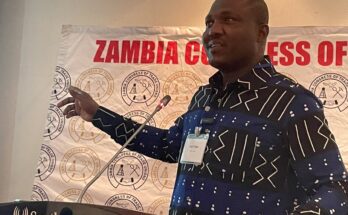Immediate past Director General/CEO of the Nigerian Meteorological Agency (NiMet), Dr. Anthony C. Anuforom, was recently conferred with the Fellowship of the Renewable and Alternative Energy Society of Nigeria (FRAES), in Port Harcourt, Rivers state. This erudite environmentalist in a chat with DONALD IORCHIR , talks on the nation’s environmental problems, climate change, effect on food security of uncontrolled displacement of farmers from farmland across the country, as well as the effort to reclaim the Lake Chad. Excerpts
Give us brief background information about you. Who is Dr. AC Anuforom? Where did you serve, in what capacity and for how long sir? What were the legacies you left behind where you served?
I think the most relevant background information about me in this context is that I am the immediate past Director General/CEO of the Nigerian Meteorological Agency (NiMet). I held this position for 10 years (2007 to 2017) two terms of five years each, from 2007 to 2017. I was also the Permanent Representative of Nigeria with the World Meteorological Organization (WMO). I was elected into the Executive Council of WMO and served on the Council for 8 years. At the sub-regional level, I was a member of the Governing Board of the African Centre for Meteorological Applications for Development (ACMAD) in Niamey.
Regarding the legacies I left behind, time and space will not permit me to chronicle the details. It is a lengthy catalogue! Suffice it however to say that upon my appointment as DG, I set out to elevate NiMet to a parastatal whose operations and services meet international standards. Despite the very lean financial resources, I pursued this goal vigorously by embarking on extensive development of operational infrastructure, equipment and human resources. Throughout my tenures in office, I was lucky to have very supportive bosses (ministers and permanent secretaries) at different times, as well as competent and motivated staff who shared my vision and passion for the Agency. The combination of these factors, coupled with my personal determination and the grace of God, made it possible for me to achieve the goal of elevating NiMet to international standard.
Accurate and timely weather forecasts
The certification and re-certification of NiMet’s aeronautical meteorological services by the International Organization for Standardization is an eloquent testimony to this fact. The tremendous improvement in infrastructure, equipment and human capital achieved in NiMet during my tenure translated to more accurate and timely weather forecasts and climate predictions which Nigerians still attest to. NiMet’s Seasonal Rainfall Prediction (SRP) is now very popular among operators in various sectors of the economy. The accuracy of the SRP had exceeded 80%, and we commenced downscaling to state/local government level.
During my tenure, NiMet’s operational and service delivery capacity had developed to the extent that the Agency could provide weather forecasts to Liberia and Sierra Leon. Our instrument calibration laboratory also provided services to Ghana Meteorological Agency.
Can you tell us what you have been doing since you disengaged and what you plan to be doing in the future?
Well, naturally I have tried to slow down to take some rest after a hectic working life. My children tell me to slow down, but I must confess that it is not easy slowing down when by the grace of God; one is still physically and mentally strong. While slowing down, I also try not to slide into idleness. Don’t forget that I studied physics and for the last fifteen years I applied my knowledge of the subject in my job in NiMet; first as the Director of Applied Meteorological Services for approximately five years and later as the Director General/CEO for 10 years. I needed to refresh my knowledge in those aspects of my studies that I never got to use in my job.
National conference of astronomical society
I have been reading research publications and other materials. I have also been participating in some conferences. In the past one year, I have presented papers at two national scientific conferences, namely: ‘Effect of solar activity on frequency of thunderstorms and squalls in Nigeria’ presented at the 7th National Conference of the Astronomical Society of Nigeria held at Enugu in November 2017 and ‘The Role of Renewable Energy in Achieving the Greenhouse Gas Emission Reduction Target in Nigeria’s Nationally Determined Contribution to Paris Climate Change Agreement’, which I presented at the 8th Annual Conference of the renewable & Alternative Energy Society of Nigeria in April this year. This was held in Port Harcourt. I also attended the meetings of the Nigerian Academy of Science. I delivered the 2013 Annual Lecture of the Academy and they extend invitations to their annual events since then. A very good friend of mine, Professor Chidi Akujor, a Professor of astronomy at Federal University of Technology, Owerri (FUTO) has been encouraging me in these academic activities. In fact, we are working together with the professor on some papers which we hope to jointly publish very soon. I have really enjoyed these academic activities. Looking forward, I will continue these academic activities and also engage in private sector and NGO activities to promote climate smart agriculture in Nigeria, especially among rural farmers. I also plan to get involved in bridging the gap between Climate Information providers and end users. This will be from private sector and NGO perspective and in collaboration with relevant agencies.
The environment has witnessed many changes in the past few years and despite these changes, public awareness about environmental degradation has been too low in the country. What is your advice to government to raise public awareness on environmental issues? Are Nigerians really protecting their environment sufficiently?
Changes in the environment are continuous and inevitable because some are natural while others are human-induced. For instance, construction of houses, roads, bridges, dams and other physical infrastructure which are necessary for economic activities, inevitably result in human induced changes in the environment. These developmental activities will not normally constitute much challenge if they are carried out in compliance with regulations stipulated by the appropriate Authorities.
Hazards to human health and safety
However, unplanned and unregulated changes to the environment constitute hazards to human health and safety; and jeopardize the needs of future generations. That is why the United Nations is advocating for sustainable development.
Soil erosion, desertification, deforestation, coastal erosion, air, water and oil pollution, indiscriminate refuse dumping, improper disposal of industrial wastes, etc are all forms of environmental degradation being experienced in Nigeria. They are not hidden. Everyone sees them all around us; and so, I don’t think that Nigerians are not aware of the degradation to the environment. What is lacking among the Nigerian public is the awareness of their role in preventing environmental degradation. There is need to create awareness about those things we do that harm the environment. Nigerians need to be educated on their roles and responsibilities in conserving the environment. Government should implement the National Policy on the Environment, which includes Environmental Education and Awareness Creation. Awareness creation can be achieved speedily through closer collaboration between government and NGOs. It is also important for government to strengthen the relevant Agencies, such as NESREA, NOSDRA, etc, to enforce environmental protection regulations.
Climate change has drastically altered rainfall patterns especially in Nigeria to the point that some experts have predicted that serious food shortages might set in next year, over-grazing and herdsmen attacks throughout the country. Do you agree with this view and what should be done to prevent or avert food scarcity in Nigeria next year?
Yes. Climate change is real; it is a global challenge and Nigeria is not immune to its impacts. It has indeed not only altered the rainfall pattern, but also impacted negatively on the ecosystem in many parts of Nigeria. On my assumption of office as the DG/CEO of the Nigerian Meteorological Agency (NiMet) in 2007, we stepped up the accuracy and timeliness of the Seasonal Rainfall Prediction (SRP). We also introduce the Annual and Quarterly Climate Review Bulletins. Based on the analyses of long-term rainfall data from our weather observatories across the country, we established the fact that rainfall characteristics over most parts of Nigeria have changed. I made this fact public since 2008 and continually reiterated it in subsequent years in most of my public discussions; especially during our annual SRP presentation. Other independent researchers in the universities and research institutes have also arrived at the same conclusion. So, it is correct to say that the pattern of rainfall in Nigeria has changed.
Predictions of food shortage
For this year 2018, NiMet predicted a normal length of rainy season with normal rainfall amounts, and that this should not present any major threat to agriculture. But there are other factors which affect food production and availability. So, if there are predictions of food shortage by other experts outside NiMet, these may be attributed to some other factors than rainfall. We should also not lose sight of the fact that the population of the country is increasing and this means that demand for food is also increasing. At the same time climate change and environmental degradation are reducing the available land for cultivation as well as agricultural yield.
It noteworthy that between 1960 when Nigeria became independent and the present, the country’s population density has quadrupled from about 50 persons per square kilometre to over 200 persons per square kilometre. By 2030 the population density would have increased to 284 persons per square kilometre. The increasing pressure and exploitation of land, forest and water resources contribute to loss of soil fertility and declining agricultural productivity.
One could say that although rainfall is a critical factor and sine qua non for good agricultural yield, other factors could still lead to food shortages. If nothing is done, this situation will get worse in future as the population and demand for food continue to increase. The UN projects that by 2050 Nigeria will be the 6th most populous country in the world.
Traditional and conventional methods of agriculture are therefore no longer sustainable. They must be replaced by a more scientific approach that guarantees increased and sustainable productivity. I advocate the application of Climate Smart Agriculture (CSA) as a means of tackling this challenge.
Many communities have been displaced from their ancestral homes by migrating armed herdsmen to the point that farming has reduced, and the government has been helpless toward the emerging situation? Do you think that this phenomenon can contribute to food security or food scarcity when large parts of the country in the northeast, north central and even the northwest are in a state of uncertainty and hostile attacks?
The impact of the insurgency in the Northeast of Nigeria and the widespread activities of marauding herdsmen in parts of the country where farming is the predominant occupation should not be underestimated. Millions of farmers, who have been displaced from their homes and farmlands, are no longer able to contribute to food production.
What do you suggest to Nigeria and by extension other West African states to do to reclaim the receding Lake Chad which has largely been taken over by desert encroachment? Do you think that the stakeholders have so far shown sufficient political will to carry out the reclamation process?
The shrinking and drying of Lake Chad is a huge environmental challenge, with far-reaching socio-economic, political and security implications for Nigeria and the other countries bordering the Lake Basin. These challenges are already well known. For ages Lake Chad has been supporting economic activities and means of livelihood for over 40 million people in the area which includes Nigeria, Chad, Niger and Cameroon.
Fishing, farming (crop production) livestock production and crafts are the main occupations which have been contributing to food security, employment, poverty reduction, and hence social stability, in the countries bordering the Lake. With the shrinking of the Lake, coupled with population growth, all these socio-economic benefits have been jeopardized.



